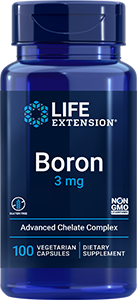
Newsletter
Newsletter
Vitamin E associated with lower risk of peripheral neuropathy in chemo patients

A meta-analysis of randomized, controlled trials reported on June 18, 2021 in the Annals of Nutrition and Metabolism found a significant reduction in the risk of developing chemotherapy-induced peripheral neuropathy (CIPN) in cancer patients who received vitamin E in comparison with a placebo.*
CIPN is characterized by severe pain and deterioration of function of the peripheral nervous system. It’s not uncommon, either. The condition often necessitates a reduction in the dose of chemotherapy that can be used. “Chemotherapy-induced peripheral neuropathy is one of the most common adverse effects of chemotherapeutic agents,” wrote authors Huikai Miao of Sun Yat-sen University Cancer Center and colleagues. “The incidence of this disabling pain reaches up to 68% in the short term when receiving chemotherapy.”
Studies have indicated that reactive oxygen species (a type of free radical) are a cause of CIPN, which suggests that antioxidants such as vitamin E may be protective.
For their analysis, Dr. Miao’s team selected eight randomized, controlled trials that included a total of 488 cancer patients. Doses of 300, 400 or 600 milligrams (mg) vitamin E or a placebo were administered in conjunction with cisplatin, paclitaxel and/or other chemotherapies beginning as early as the initiation of chemotherapy and continuing up to three months following its cessation.
Results:
- Pooled analysis of data found an 18% lower risk of CIPN in association with vitamin E intake compared to the placebo.
- When trials that administered 600 mg per day vitamin E were examined, a 69% lower risk of CIPN was revealed among vitamin E-treated participants in comparison with placebo-treated patients.
- Subsequent analysis according to type of chemotherapy found a risk of peripheral neuropathy that was 72% lower than that experienced by the placebo group among cisplatin-treated individuals who received vitamin E.
Analysis of data from two studies that reported sural amplitude, which is used to evaluate peripheral neuropathy severity, found significant improvement after three rounds of chemotherapy in patients who took vitamin E in comparison with a placebo. Another indicator of severity, known as median amplitude, was assessed in two studies and found to be improved in treated patients.
“Available data in this meta-analysis showed that vitamin E…can confer modest improvement in the prevention of CIPN,” the authors concluded. “Vitamin E…as the standard of care for prevention of CIPN is moderately recommended in our study.”
*Miao H et al. Ann Nutr Metab. 2021 Jun 18;1-11.
Products
Apply What You've Learned: Chemotherapy
- Chemotherapy is the treatment of cancer with drugs that impair cancer cells’ ability to grow and divide. Other common cancer therapies include surgery, radiation and immunotherapy. Alternative therapies also exist; however, many have not been as well studied as conventional therapies.
- Chemotherapy, while often a lifesaver, is associated with significant side effects. However, certain nutrients as well as techniques such as intermittent fasting can help reduce these effects.1
- Chemosensitivity testing involves obtaining a sample of a tumor to evaluate the effects of a panel of drugs typically used to treat the type of cancer a patient has. This may help predict the effectiveness of cancer chemotherapy.2
- In addition to vitamin E, intravenous calcium and magnesium, glutathione, N-acetylcysteine, omega-3 fatty acids and other nutrients have shown protective effects against chemotherapy-induced peripheral neuropathy in human trials.3-6
References
- Naveed S et al. Oman Med J. 2014 Nov;29(6):391-8.
- Grigsby PW et al. Gynecol Oncol. 2013 Jul;130(1):188-91.
- Xu XT et al. J Dig Dis. 2013 Jun;14(6):288-98.
- Cascinu S et al. J Clin Oncol. 1995 Jan;13(1):26-32.
- Lin PC et al. Support Care Cancer. 2006 May;14(5):484-7.
- Ghoreishi Z et al. BMC Cancer. 2012 Aug 15;12:355.
Featured Life Extension Magazine® Article
Case Study: Fighting Leukemia, by Charles Bolton
Chronic lymphocytic leukemia (CLL) is the most common form of leukemia diagnosed in adults. Although it progresses slowly, it can still be fatal. The American Cancer Society has estimated that 4,320 patients will die from CLL this year.
This case study documents a female patient with aggressive CLL characterized by a particular genetic mutation. Conventional chemotherapy was not successful in treating her disease. However, a two-drug combination consisting of an immunotherapy that is a synthetic form of interleukin-2 and the cancer drug venetoclax (which targets a protein that is overexpressed in CLL cells) allowed the patient to achieve complete remission.
What's Hot
Health Concern
Vitamin D shows promise against chemo side effect
The June 2020 issue of Current Opinion in Supportive and Palliative Care published a review by researchers at the University of South Australia that suggests a potential protective effect for vitamin D against the painful ulceration of the digestive tract known as gastrointestinal mucositis, which is induced by chemotherapy.
Chemotherapy
Cancer chemotherapy involves treating cancer with drugs that impair the ability of malignant cells to grow and divide (Galmarini 2012; ASCO 2014; Mayo Clinic 2015).
Related Life Extension Magazine® Articles

Against All Odds
How Jane McLelland Survived Terminal Cancer (and is Helping Others Do the Same)
Jane McLelland beat cervical, lung, and blood cancers using the missing link to defeat cancer: starving it. She is partnering with Life Extension® to help other patients achieve the same results.

Natural Solutions for Skin Reactions Related to Cancer Treatments
Radiation, chemotherapy, and surgery often lead to painful and unsightly dermatological effects, from rashes and dryness to acne and extreme dryness. Here we describe nutrients that can resolve these problems topically.
Register for the Longevity Investors Conference
Use code LifeExtensionVIP to get 20% OFF conference registration.
Expert Education, Networking & Investment Opportunities
September 27, 2021, 3 PM - 7 PM CET/ 9 AM - 1 PM ET
Virtual Conference
#LongevityInvestors
Life Extension Magazine® Issue Now Online
In a clinical trial, scientists identified two plant extracts that increased hair growth for 95% of men with male pattern baldness.
Own My Wellness
These simple, science-based self-care solutions can help you stay well, year-round.







